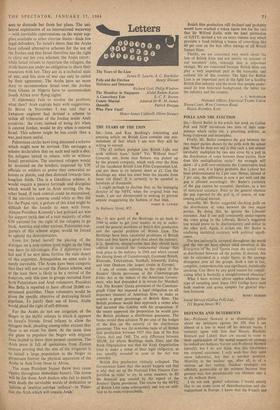S/R,—II was good of the i Boultings to go back
to 1944 in order to get your readers to try to under- stand the general problems of British film production and the special problem of British Lion. The Boultings have been successful producers of British films and they know a good deal about the industry. It is, therefore, unforgiveable that they should have omitted to mention the fundamental change that, took place in the industry in 1948 and which caused the closing down of Gainsborough, Gaumont British, Riverside, Twickenham, Southall, lsleworth, Ealing and later Denham (the largest studio in Europe).
I am, of course, referring to the repeal of the Renters' Quota provisions of the Cinematograph Films Act at the behest of the American Govern- ment, who had demanded it in return for Marshall Aid. The Renters' Quota provisions of the Cinemato- graph Films Act imposed a legal obligation on all importers (renters) of American films to make or acquire a given percentage of British films. The British producer would then approach a renter who had incurred this liability with his proposition. if the renter approved the proposition he would give the British producer a distribution guarantee. The banks would then advance 70 per cent of the budget of the film on the security of the distribution guarantee. This was the economic basis of all British film production between 1927 (the date of the first Quota Act) and 1948. The only difference between MGM, for whom Boultings made films, and the Rank Organisation was that the Rank Organisation tried to make a virtue of their legal obligation, as was speedily revealed as soon as the Act was amended.
British film production virtually collapsed. The
Government knew that this would happen and that is why they set up the National Film Finance Cor- poration in order to try, in some measure, to fill the financial gap created by the repeal of the Renters' Quota provisions. The rescue by the NFFC of British Lion came subsequently and was an addi- tion to its main responsibility.
British film production still declined and probably would have reached a token figure but for the fact that Sir Wilfred Eadie, with the kind permission of GAIT, devised a tax on every cinema seat which provides a fund yielding a bonus of something like 40 per cent on the box office takings of all British feature films.
Finally, we are concerned very much about the fate of British Lion and not merely on account of our members' jobs, although that is important enough. We are concerned because British films can play a very important part in the economic and cultural life of this country. The fight for British Lion is an important part in the fight for a healthy British film industry and the more that people under- stand its true historical background, the better for the industry and the country.
A. C. BATCHELOR
National Officer, Electrical Trades Union Hayes Court, West Common Road, Hayes, Bromley, Kent


































 Previous page
Previous page